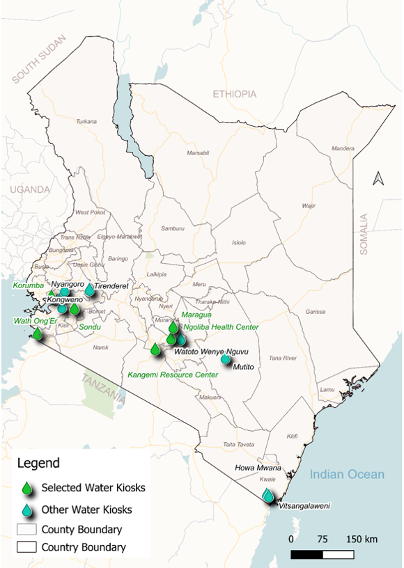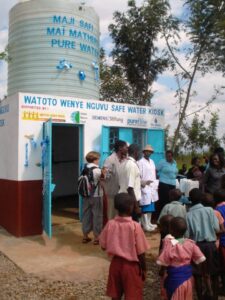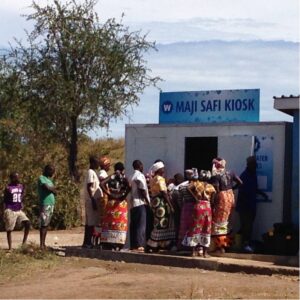In February 2024, our long-term global partner, SIEMENS Stiftung, released a research study on the success and impact of the decentralised water kiosk model and its technical and economic viability. This study followed the Safe Water Enterprise (SWE) Project initiated by SIEMENS Stiftung and SkyJuice Foundation in 2012 in Kenya.
The Safe Water Enterprises (SWE) project is locally labelled and known as Maji Safi kiosks. The kiosks were designed, fabricated and commissioned by SkyJuice and utilised the sustainable SkyHydrant ultra filtration technology. The imperative was to increase access to a steady supply of clean drinking water in underserved rural and peri-urban communities with limited infrastructure in East Africa.
According to water.org, about 28 million Kenyans still lack access to safely managed water. For Kenya, universal access to Water, Sanitation, and Hygiene Services (WASH) by 2023 requires a USD 22 billion investment to expand and improve the current services. The SWE Kiosks project was initiated to fill the safe water access gap and concept-proof the decentralised water kiosk model as a social entrepreneurial business.
In 2023, after over ten years of operation, SIEMENS Stiftung carried out a research study to evaluate the SWE project’s impact. The study assessed six SWE kiosks within a community set up across five counties in Kenya.

Korumba Kiosk
Wath Ong’er Kiosk
Sondu Kiosk
Maragua Market Kiosk
Ngoliba Health Centre Kiosk
Kangemi Resource Centre
Individual water kiosk system set ups.

While challenges with the project remain, the study found benefits and positive impacts in the following key areas.
SHORTER WAITING TIMES AND DISTANCES
- Most Maji Safe users experienced minimal wait times, with an average wait of 5 minutes or less.
- “…my kids now have more time to play and finish their homework, as I attend to other household chores.” -reports a household from Sondu Kiosk.
REDUCED WATERBORNE DISEASES AND IMPROVED WATER QUALITY AND HYGIENE
- Across six sites, users reported a reduction in waterborne diseases, with over 90% of respondents rating the water as clean and safe.
- An interview with a health office at Wath Ong’er indicated that there were reduced cases of diarrhea and cholera in the community thanks to the Maji Safi Kiosk.
- Improved hygiene and sanitation standards were reported across the six sites, with Maragua and Sondu kiosks having latrines that serve the local community.
- “… I no longer have to worry about treating or boiling drinking water. Maji Safe has been of great help.” – reports a Maji Safi user in Ngoliba.
ENTREPRENEURIAL MINDSET AND INCOME GENERATION OPPORTUNITIES
- The existence of the Maji Safi kiosk has led to a rise in business establishments, especially water vending. This has promoted social and economic well-being.
- “…from the water vending business, I have been able to take my son through high school and now enrolled for college studies.” -reports Mary, a water vendor at Wath Ong’er.



While all six SWE kiosks are technically, financially, and environmentally sustainable, none of them can scale their operations in their current state. All six kiosks would require minor operational adjustments and external support to scale their operations and remain sustainable in the long run.
The following key points were found essential for the long-term success of any decentralised water kiosk set-up:
EFFICIENT WATER PROVISION REQUIRES RELIABLE TECHNOLOGY
- The patented SkyJuice Foundation water filtration technology is well-suited for surface water (rivers, dams, etc) and some groundwater (shallow wells and boreholes). It can produce up to 10,000 litres of clean water per day for around 1,000 families.
ADEQUATE AND CONTINUED STAKEHOLDER ENGAGEMENT IS INSTRUMENTAL
- Different stakeholders are engaged for different purposes; for example, the Public Health Officers (PHOs) and Community Health Volunteers (CHVs) are engaged at the county level alongside KWAHO and SWAP Kenya to assist in capacity building and raising awareness.
REVENUES GENERATED FROM THE KIOSK MAY ONLY ENSURE SUSTAINABILITY BUT NOT SCALABILITY OF THE KIOSKS
- “…we are looking to set up a satellite kiosk in Nyakweri and Osiri, but this would require us to seek financial assistance as our current revenues are inadequate to support this initiative.” -reports a team member from Wath Ong’er Centre, Migori County
ULTIMATELY, THE KIOSKS CAN ONLY PROJECT WHAT THEY CAN TRACK
- Revenue classification and record-keeping still require guidance, training, and capacity building. As the majority of the kiosks would require financial assistance to scale up, clear record-keeping would be required to access credit.


‘TAKE HOME’ MESSAGES
- MSG outcomes require community collaboration and involvement.
- Ownership and responsibility should be vested within communities.
- Technical factors are not always the primary driver for sustainable long-term outcomes.
- Ultra-Filtration technology is reliable and scalable and is widely accepted by stakeholders within developing countries.
FURTHER READING AND INFORMATION
Visit the SkyJuice Safe Water Kiosk product page to find out more.
Some previously published safe water stories about Maji Safi Kiosks
Wath Ong’er Safe Maji Safe Water Kiosk, Kenya
Published research
Experiences and Analysis of Safe Kiosk Models in Kenya, 2013.
Authors: Rhett Butler and Christine Weyrich.


